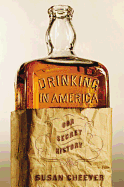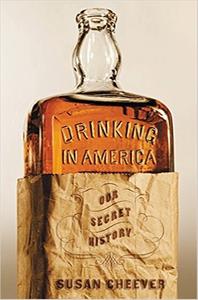
 Historian and biographer Susan Cheever (E.E. Cummings) believes alcohol and drinking have been an underlying force shaping the American story from the 17th century to the present. She launches her engrossing, insightful narrative with the Mayflower, which transported 200 barrels of alcohol to the New World. The voyage was beset with difficulties, and adults and children consumed beer for sustenance and to maintain health, as water stockpiled in barrels onboard grew fetid. Running out of beer was a major reason the Pilgrims landed at Cape Cod and not further south. Ten years later, the Puritans jump-started the American brewing industry and their efforts paved the way for the production of distilled liquor: whiskey, cider and, later, rum.
Historian and biographer Susan Cheever (E.E. Cummings) believes alcohol and drinking have been an underlying force shaping the American story from the 17th century to the present. She launches her engrossing, insightful narrative with the Mayflower, which transported 200 barrels of alcohol to the New World. The voyage was beset with difficulties, and adults and children consumed beer for sustenance and to maintain health, as water stockpiled in barrels onboard grew fetid. Running out of beer was a major reason the Pilgrims landed at Cape Cod and not further south. Ten years later, the Puritans jump-started the American brewing industry and their efforts paved the way for the production of distilled liquor: whiskey, cider and, later, rum.
By the middle of the 18th century, taverns in the early colonies "served as inns, courthouses and town halls before those structures were built." As anger against England surged, excessive drinking, combined with talk of politics, provoked unrest and defiance. Thus, the idea of independence escalated, leading to the American Revolution, which was fueled by rum consumption. The founding fathers, including George Washington, plied soldiers with alcohol to embolden them to fight and also to numb the pain of the wounded and dying.
The well-researched and well-developed timeline Cheever presents winds through the Whiskey Rebellion; Johnny Appleseed planting apple orchards on the frontier that led to healthy apple cider production and, later, 66 proof applejack; Meriwether Lewis's reliance on whiskey to help build the Erie Canal; alcohol profiteering, including how the rum trade was connected to slavery; and the Civil War, where liquor helped turn the tide of battle--for better or worse.
To great effect, Cheever contrasts the personalities and accomplishments of teetotalers in history such as Alexander Hamilton, General Custer and Abraham Lincoln against ardent drinkers like John Adams, two of whose sons died of alcoholism at a time when it was a rare diagnosis. The Adams family dynamic serves as a springboard into Cheever's personal story and family legacies of alcoholism as inherited diseases. In later chapters, Cheever profiles the anti-alcohol temperance movement and prohibition, leading to more contemporary issues of how alcohol has served as a vice of the creative life, including that of her own father, John Cheever; the effect of alcohol on Joseph McCarthy's paranoia and arrogance; how hangovers may have dulled Secret Service response on the day of President Kennedy's assassination; Richard Nixon's veiled alcohol addiction; and the formation of Alcoholics Anonymous and Mothers Against Drunk Driving to combat alcoholism as a significant public health problem.
Cheever cites many examples of how alcohol and drinking have been divisive and destructive forces that have brought "pain... and incompetence" to the history of our national landscape. But she makes an equally effective and compelling historical case for how "drinking is a cherished American custom--a way to celebrate and a way to grieve and a way to take the edge off. It brings people together." --Kathleen Gerard, blogger at Reading Between the Lines
Shelf Talker: An engrossing, in-depth examination of the profound ways alcohol and drinking have shaped and contributed to American history.

